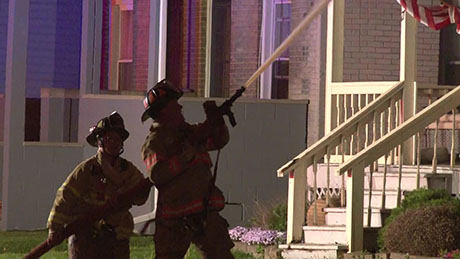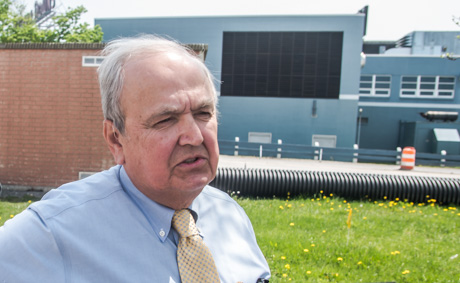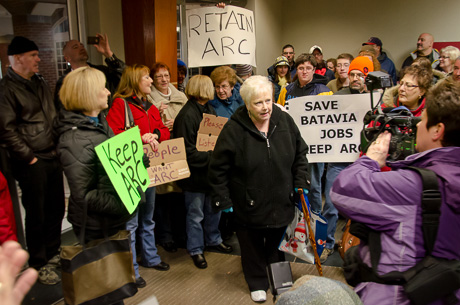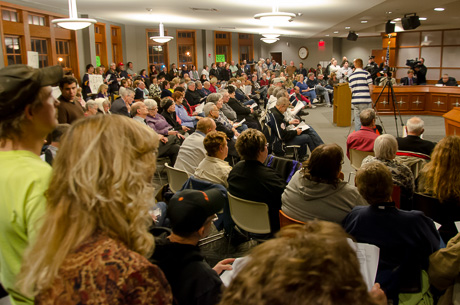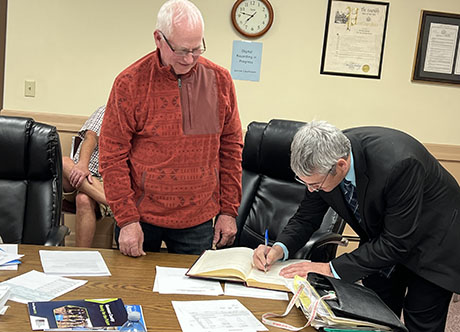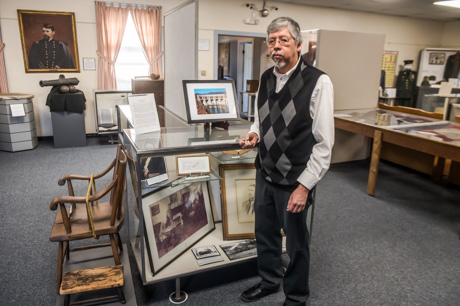A former state senator with a history of illegal activity while in office has filed a lawsuit against Batavia Downs and its leadership alleging that officials have engaged in "shameless and blatant corruption."
The suit concentrates on previously investigated accusations that officials at Western OTB have misused tickets to sporting events and concerts and that Western Regional OTB has improperly provided lucrative health insurance coverage to appointed board members.
George Maziarz, who represented Niagara County in the State Senate from 1995 to 2014 and was once considered one of the most powerful men in Niagara County, expressed some frustration today that none of the allegations against Western OTB, and in particular against his former political ally, Batavia Downs President and CEO Henry Wojtaszek, have led to anything more than recommendations for changes in procedures.
"Quite frankly, I'm disappointed that the Attorney General and the United States Attorney, the FBI hasn't done anything yet," Maziarz said during a press conference outside the casino on Park Road. " I keep being told over and over again that they're working on it."
Wojtaszek said that nothing more has come of the allegations -- either because corrective action has been taken or the claims of wrongdoing are not as clear cut as Maziarz represents.
From Wojtaszek's point of view, Maziarz is engaged in a vendetta against Western OTB. He said Maziarz was fired as a lobbyist about eight years ago, was passed over for the CEO position, and Wojtaszek participated in investigations that eventually led to Maziarz's own public corruption conviction.
"I think he's just a bitter individual," Wojtaszek said during an exclusive interview with The Batavian immediately following the press conference. "He has a vendetta against many individuals and the corporation itself. He's made complaints to every conceivable agency and regulatory body in New York State, and they've all turned down his requests to take action against OTB. They've all investigated and found that nothing was amiss here at Western Regional OTB.
"Whatever remedies or suggestions they had for us to improve our business, we follow them. We will continue to follow them and improve our organization. We hired Terry Connors to do an in-depth look at what was going on here at Batavia Downs. Terry is a well-respected individual within the legal community all across the state. We're very confident in his findings and his suggestions, and we've implemented his recommendations. We'll continue to work with him."
He said Batavia Downs has also hired a compliance company out of Buffalo, headed by a former FBI agent, to review its policies and procedures.
The Lawsuit
Attorneys for Maziarz filed the lawsuit in Niagara County on May 3. It alleges that Wojtaszek and board members misused and manipulated programs meant to attract patrons to the Batavia Downs Casino by using for themselves tickets to sporting events and concerts.
For example, according to records, the OTB purchased 5,800 high-end tickets to Buffalo Bills games, Sabers games, and concerts at Darien Lake, and 10 percent of those tickets, worth about $120,000, wound up in the hands of OTB officials and their friends and family members.
The suit alleges tickets were freely handed out at board meetings and were even used to provide a board member's daughter with a birthday party.
The suit also alleges that Wojtaszek failed to correctly record and report his personal use of a vehicle provided to him by Western OTB.
Western OTB board members are also accused of receiving gold-plated health insurance coverage in violation of state law and contrary to recommendations in a Comptroller's Audit Report, and a report compiled by attorneys hired by Western OTB to review the matter.
The suit states that these actions amount to Wojtaszek and board members using Batavia Downs as a personal ATM to enrich themselves at taxpayer expense with no real public oversite of the agency's policies and procedures.
"Over time, this almost honor system-like structure led to dishonor, cronyism, and shameless, blatant corruption," the suit states. "The corruption has been normalized, legitimized, and covered up by the Board and a bipartisan network of high-powered consultants and lobbyists hired by CEO Wojtaszek (again, with little oversight by the public) to prevent public scrutiny or reform."
The Response
In his interview today, Wojtaszek defended how Batavia Downs has handled tickets to events.
Batavia Downs acquires tickets as perks for high rollers and special guests, Wojtaszek said. A host from Batavia Downs typically accompanies these guests to the events. The role of the host is to ensure things go smoothly, that people get their tickets, get into the venue, receive the service expected for the event, and the host takes care of any issues that arise.
"Previously, if you were host, we provided a ticket to the host and then the host was allowed to bring a guest with them," Wojtaszek said. "At that point, they may have brought somebody from a wife, a husband, a son, or a daughter with them. We have since corrected that. Subsequent to the recommendation from the compliance company, it's just a host who takes care of whatever event, hockey game, football game, concert, and I think we're doing it properly now."
He said that the accusation that board members could just casually ask for tickets to Bills or Sabers games at board meetings and receive them misrepresents what actually took place. He said anybody, including board members, could ask for tickets on behalf of patrons of Batavia Downs. They were not, he said, asking for themselves and friends and family. However, to help improve the procedure, all requests must now be in writing and clearly state who is receiving the tickets.
According to the audit report Maziarz cites, Wojtaszek said, "there were thousands of tickets accounted for. There are a few, 100 I believe, that aren't, which equates to a reasonable amount of money but don't forget, each one of those tickets went to a host to host the game."
As for tickets being used for a birthday party for the daughter of a board member, that never happened, Wojtaszek said.
As for the use of a company car, Wojtaszek said, yes, he failed to complete the proper paperwork to record his personal use of the vehicle, and at the board's instruction, he reimbursed Western OTB $3,000 to resolve the issue. And yes, he is now receiving a transportation allowance -- Maziarz claims $7,000 -- but Western OTB was already in the process of eliminating agency-owned vehicles for staff when the issue came up. Besides potential liability, a car allowance for executives is more in keeping with standard practices in the business sector, Wojtaszek said.
As for health insurance for board members, Western OTB has attorneys working on the issue. The agency does not agree that board members can't receive health insurance coverage.
While Maziarz says that the Comptroller's Office and a legal firm hired by Western OTB say the practice is illegal, the issue doesn't appear to be that cut and dry. There is an older Comptroller's opinion that says the practice is permissible. The memo on the topic, prepared by attorneys Gabriel M. Nugent and Robert J. Thorpe for the board, cites the 1978 opinion as well as the later opinion and suggests board members no longer accept health insurance. It doesn't, as Maziarz claims, call the practice illegal.
Health insurance, Wojtaszek said, is justified because pretty much every other public benefit corporation in the state offers it, and Batavia Downs operates in a very competitive environment and needs to attract and retain the most qualified board members.
"What the board does here is some extremely important work," Wojtaszek said. "It is a multi-100-million dollar company that has performed extremely well over the last three to five years and has returned record amounts of revenue to the municipalities that it serves.
"If you're in a business that is very competitive -- which Batavia Downs is -- we have other private-sector casinos that we have to compete with here," he added. "And, by the way, we compete extremely well with them. You need to attract top-level talent to have those people serve on the board. And that's what we have here today. We have many, many excellent board members who have excellent business backgrounds and who lend a great deal to make this organization work. We say the compensation should be set accordingly. This is a competitive industry. It's not like a water district or sewer district. That is a monopoly where there is no competition going on."
The Players
In 2018, Maziarz entered a guilty plea to a misdemeanor count of filing a false instrument and agreed to pay a $1,000 fine. He also admitted to hiding $95,000 in campaign payments to a former staff member accused of sexual harassment. He was initially charged with five felony election law violations. The investigation into Maziarz's activities began with the Morland Commission, which had been formed to investigate public corruption.
Maziarz was also the subject of an FBI investigation. During the investigation, but before he was notified not to discard records, Maziarz reportedly had his staff shred campaign records going back to 1995.
During the press conference today, when asked about document shredding, he denied such shredding ever took place.
When asked today about his misdemeanor conviction, his first response was that Wojtaszek has one, too. Which is true. Both convictions stem from the same Attorney General investigation. Maziarz said both he and Wojtaszek received conditional discharges, which means the record is expunged if they avoid illegal activity for a specified period of time, usually six months.
Wojtaszek has been president and CEO of Western Regional OTB since 2016. Before that, he was the general council. He's been an attorney for 26 years and was active for years in Niagara County Republican politics, including a stint as chair of the county committee. He began his legal career as city attorney for North Tonawanda.
Wojtaszek said he and Maziarz once worked closely together.
Maziarz says the FBI is investigating Western OTB and Wojtaszek.
In 2019, Batavia Downs officials denied there was such an investigation. Today, Wojtaszek said the only knowledge he has of an investigation is the claim by Maziarz that a board member has been interviewed by the FBI. He said he's aware of one other inquiry by the FBI in the past three years and that dealt with a contractor and the purchase of broadcast air time. In that case, the FBI was saying it was Batavia Downs that was getting ripped off. Wojtaszek said FBI agents have never questioned him about anything related to Western OTB.
The lawsuit wasn't Maziarz's idea, Maziarz said. He said after a story appeared in a New York Times publication, an attorney for Advocates for Justice contacted him and asked him to be the face of a lawsuit against Batavia Downs on behalf of taxpayers.
Maziarz, a man who admitted to public corruption, said Advocates for Justice specialize in fighting public corruption.
The lead attorney on the case is Arthur Z. Schwartz, the organization's president and founder. Also signing the filing is Nathan McMurray, the former Delaware North attorney who unsuccessfully ran three times for a congressional seat in the NY-27, most notably losing to Chris Collins, then under indictment himself (he eventually entered a guilty plea) for insider trading. McMurray went to work for the law firm in November 2021.
As Wojtaszek noted, Maziarz has pursued corruption allegations against Western OTB for several years.
The Batavian obtained a copy of a deposition transcript from a confidential source related to a lawsuit filed by Michael Nolan, the former COO of the OTB, that reveals some of the connections between some of the players involved in the legal maneuvering and publicity-seeking of the principals.
Nolan's suit claims he was retaliated against for responding to FOIL requests from the media and others. Wojtaszek said Batavia Downs has always been transparent and has always complained with the law on requests for public documents.
Nolan was the subject being deposed in the case in January 2021 when his attorney, Stephen Cohen, jumped in and attempted to clarify something his client had said. Cohen ended up talking at length about the connections between himself, Maziarz, and reporter Phil Gambini, who has doggedly pursued corruption allegations at Batavia Downs for several years.
In the deposition, Aaron Saykin, the Western OTB attorney in the case, attempted to uncover a possible connection between Nolan and Maziarz. Cohen provided the opening because he tried to bill Batavia Downs for a phone conversation he had on behalf of his client with Maziarz.
Cohen said he did discuss Nolan's case with Maziarz but only in the service of trying to get more information from Maziarz that might assist his client's suit. He admitted that he knew Maziarz regularly spoke with Gambini and was likely the source of information that appeared in Gambini's stories about Batavia Downs.
Saykin's questions suggested that Saykin suspected Cohen of trying to plant stories with Gambini, including a March 29, 2019 story about the supposed FBI investigation. Cohen deflects the questions and denies any interest in press coverage.
He said his only real interest was getting more information from Maziarz.
"I sought to get whatever I could out of Senator Maziarz," Cohen said according to the transcript.
Mr. Saykin: Because you knew he was pissed at Henry?
Mr. Cohen: Yes.
Mr. Saykin: And you knew he wanted to hurt Henry?
Mr. Cohen: Yes.
Photos by Howard Owens
During the first several minutes of the press conference this afternoon in the back parking lot of the former Kmart building, across the street from Batavia Downs, two Batavia Downs work trucks paraded up and down Park Road and through the parking lot (Park Road is undergoing reconstruction) and honked their horns, disrupting the press conference. Maziarz called the action sophomoric and evidence that Western OTB officials want to prevent the public from finding out what is going on at the facility. Batavia Downs President and CEO Henry Wojtaszek said when he found out what was going on with the trucks, he put a stop to it.



